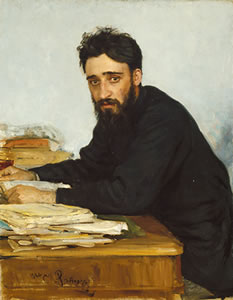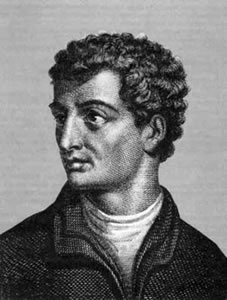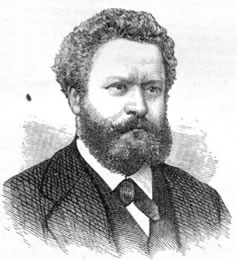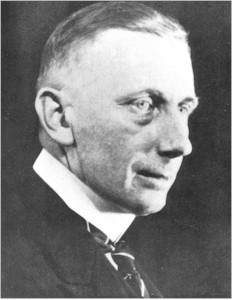Piet Paaltjens was het pseudoniem van de Nederlandse dichter en predikant François Haverschmidt Hij werd geboren in Leeuwarden op 14 februari 1835. HaverSchmidt studeerde in Leiden. Als predikant werkte hij in Foudgum, Raard, Den Helder en Schiedam. Zijn bekendste bundel is Snikken en grimlachjes uit 1867. Piet Paaltjens wordt in deze bundel door middel van een mystificatie opgevoerd: de schrijver geeft in de inleiding een levensgeschiedenis van de student-dichter Paaltjens tot zijn verdwijning uit Leiden ‘op den 9 oktober 1853.
Zijn goudblonde lokken en knevel
Zijn goudblonde lokken en knevel,
Zijn geestvolle neus en mond,
Zijn vergeetmijnietblik, zijn tenorstem
En zijn New-Foundlandsche hond,
Ik moet er gedurig aan denken;
Zelfs adem ik soms nog flauw
Den geur in van zijn sigaren.
Hij kocht ze gewoonlijk bij Blaauw.
Ruik ik opnieuw die sigaren,
Dan wordt is eensklaps zoo raar.
Is ’t, omdat hij ze rookte,
Of was de tabak mij te zwaar?
Zooals ik eenmaal beminde
Zoo minde er op aarde nooit een,
Maar ‘k vond, tot wien ik mij wendde,
Slechts harten van ijs en van steen.
Toen stierf mijn geloof aan de vriendschap,
Mijn hoop en mijn liefde verdween,
En zooals mijn hart toen haatte,
Zoo haatte er op aarde nooit een.
En sombere, bittere liedren
Zijn aan mijn lippen ontgeleen;
Zoo somber en bitter als ik zong,
Zoo zong er op aarde nooit een.
Verveeld heeft mij eindlijk dat haten,
Dat eeuwig gezang en geween.
Ik zweeg, en zooals ik nu zwijg,
Zoo zweeg er op aarde nooit een.

Piet Paaltjens (14 februari 1835 – 19 januari 1894)
De Russische schrijver Wsewolod Garsjin werd geboren op 14 februari 1855 in Prijatnaja Dolina. Hij schreef vooral korte verhalen en was daarmee een voorloper van Tsjechov. Garsjins vader was een officier in het leger die in aanwezigheid van zijn zoon zelfmoord pleegde toen deze zeven jaar was. Garsjin zelf diende ook in het leger tijdens de Russisch – Turkse oorlog en zijn eerste verhalen hadden de oorlog als onderwerp, zoals „Vier dagen“. Zijn literaire werk is niet zeer rijk van omvang: ongeveer 20 verhalen, uitgegeven in één bundel. Zijn bekendste verhaal is „De rode bloem“. Garsjin had, versterkt door de oorlog, een zwakke geestelijke gezondheid en leed aan depressies. Op 31 maart 1888 pleegde hij zelfmoord door zich in het trappenhuis van zijn flat 5 verdiepingen naar beneden te laten vallen.
Uit: The scarlet blossom
“In the name of His Imperial Majesty the Lord Emperor Peter the First, I order a revision of this Asylum!”
Those words were uttered in a loud, strident, resounding voice. The clerk who had registered the patient in a large dilapidated book lying on an ink-bespattered table could not restrain a smile. But the two young men who had escorted the patient did not smile. They could scarcely keep on their feet after forty-eight hours without sleep, passed alone with the lunatic whom they had just brought along by train. At the station immediately preceding their destination the attack had increased in its intensity, and they had succeeded in obtaining a strait-jacket from somewhere, which, with the assistance of the train-conductors and a gendarme, they had placed on the patient, and had brought him to the town, and finally to the Asylum in this dress.
He was dreadful to look at. Over his body and above his grey suit, which had been torn into rags during his paroxysms, was stretched a jacket of coarse canvas opened in front; its sleeves, which were fastened behind, forced his arms crosswise against his chest. His blood-shot eyes (he had not slept for ten days) blazed with a fixed and intense glare. His lower lip was twitching with a nervous tremor, whilst his tangled, curly hair fell mane-like over his forehead. With rapid, agitated steps, he paced from corner to corner of the office, gazing inquisitively at the old shelves laden with documents, and the chairs covered with a kind of oilcloth. Occasionally he glanced at his recent fellow-travellers.

Wsewolod Garsjin (14 februari 1855 – 31 maart 1888)
De Italiaanse dichter Leone Battista Alberti werd geboren in Genua op 14 februari 1404. Naast dichter was hij ook schilder, taalkundige, filosoof, cryptograaf, musicus, en architect en een van de belangrijkste personen uit de Renaissance. Zijn leven werd beschreven in de Vite van Giorgio Vasari. In Italië wordt zijn voornaam gewoonlijk gespeld als Leon. Alberti was een onrechtmatige zoon van een familie van Florentijnse handelaars. Hij studeerde rechten aan de Universiteit van Bologna. Alberti maakte een reis door Europa toen hij midden-twintig was. Zijn carrière in het recht werd ingekort door een ziekte die een gedeeltelijk verlies van geheugen veroorzaakte. Alberti wijdde toen zijn capaciteiten aan wetenschap en kunst. Hij schreef rond 1436 Della pittura (‘Over de schilderkunst’), waarin hij de resultaten van zijn studie naar de wetten van het perspectief schreef. Hij was de eerste die regels voor het wetenschappelijk perspectief opstelde. Dit boek werd als het standaardwerk beschouwd door vele schilders.
Uit: On painting (Vertaald door John R. Spencer)
“Since then, I have been brought back here [to Florence]–from the long exile in which we Alberti have grown old–into this our city, adorned above all others. I have come to understand that in many men, but especially in you, Filippo, and in our close friend Donato the sculptor and in others like Nencio, Luca and Massaccio, there is a genius for [accomplishing] every praiseworthy thing. For this they should not be slighted in favour of anyone famous in antiquity in these arts. Therefore, I believe the power of acquiring wide fame in any art or science lies in our industry and diligence more than in the times or in the gifts of nature. It must be admitted that it was less difficult for the Ancients–because they had models to imitate and from which they could learn–to come to a knowledge of those supreme arts which today are most difficult for us. Our fame ought to be much greater, then, if we discover unheard-of and never-before-seen arts and sciences without teachers or without any model whatsoever. Who could ever be hard or envious enough to fail to praise Pippo the architect on seeing here such a large structure, rising above the skies, ample to cover with its shadow all the Tuscan people, and constructed without the aid of centering or great quantity of wood? Since this work seems impossible of execution in our time, if I judge rightly, it was probably unknown and unthought of among the Ancients. But there will be other places, Filippo, to tell of your fame, of the virtues of our Donato, and of the others who are most pleasing to me by their deeds.”

Leone Battista Alberti (14 februari 1404 — 25 april 1472)
De Franse toneelschrijver Pierre-Claude Nivelle de La Chaussée werd geboren op 14 februari 1692 in Parijs. In zijn comedie larmoyante vervaagden de grenzen tussen drama en komedie. In 1731 publiceerde hij Epître de Clio, een didactisch gedicht ter verdediging van Leriget de la Faye in diens dispuut met Antoine Houdar de la Motte, die beweerde dat het schrijven van drama in verzen onzin was.
Uit: EPITRE DE CLIO
« O toi, jadis élevé dans mon sein,
Enfant nourri de mon lait le plus sain,
Viens, prends la plume et le style d’Horace
Ecoute, écris, et venge le Parnasse.
Le Fanatisme, au bas de ce vallon,
Veut pervertir les enfans d’Apollon ;
Et, leur prêchant un nouveau catéchisme,
Porte avec lui le scandale et le schisme.
Tâchons enfin d’arrêter les projets
De l’hérétique. Assez de nos sujets,
Comme brebis, se suivant l’une et l’autre,
Pour son bercail ont déserté le nôtre.
Aux nouveautés toujours prostitué,
Et dans l’erreur sophiste habitué,
Quand il lui plaît, sa plume hétérodoxe
En axiome érige un paradoxe ;
Sa bouche exhale un aimable poison
Le tort lui sert autant que la raison,
Et tout chemin le conduit à la gloire.
Ce fut ainsi qu’au temple de Mémoire
Il appella de la prescription
Dont jouissoit le chantre d’Ilion. »

Pierre-Claude de La Chaussée (14 februari 1692 – 14 mei 1754)
De Franse schrijver Edmond François Valentin About werd geboren op 14 februari 1828 in Dieuze, Lorrainne. Hij kreeg zijn opleiding aan de Ecole Normale Supérieure en aan de Franse school in Athene. Als schrijver debuteerde hij met een omstreden werk, La Grèce Contemporaine (1854), en met een controversiële roman Tolla. L’Homme à l’Oreille Cassée (1862) maakte hem populair, maar zijn toneelstukken vielen niet in goede aarde bij het publiek.
Uit: Germaine
« Vers le milieu de la rue de l’Université, entre le numéro 51 et le 57, on voit quatre hôtels qui peuvent compter parmi les plus beaux de Paris. Le premier appartient à M. Pozzo di Borgo; le second, au comte de Mailly; le troisième, au duc de Choiseul; le dernier au baron de Sanglié. C’est celui qui fait l’angle de la rue Bellechasse.
L’hôtel de Sanglié est une habitation de noble apparence. La porte cochère s’ouvre sur une cour d’honneur soigneusement sablée et tapissée de treilles centenaires. La loge du suisse est à gauche, cachée sous un lierre épais où les moineaux et les portiers babillent à l’unisson. Au fond de la cour à droite, un large perron, abrité sous une marquise, conduit au vestibule et au grand escalier. Le rez-de-chaussée et le premier sont occupés par le baron tout seul; il jouit sans partage d’un vaste jardin borné par d’autres jardins, peuplé de fauvettes, de merles et d’écureuils qui vont de l’un chez l’autre en pleine liberté, comme s’ils étaient habitants d’un bois, et non citoyens de Paris. »

Edmond About (14 februari 1828 – 16 januari 1885)
De Canadees-Duitse schrijver en vertaler Frederick Philip Grove werd geboren als Felix Paul Greve op 14 februari 1879 in Radomno, Westpruisen. Hij maakte naam als dichter, romanschrijver en (mede-)grondlegger van de postkoloniale, moderne Canadese literatuur. Tussen 1922 en 1947 publiceerde hij ongeveer 15 werken. Naast zijn romans over de Canadese priarie en haar bewoners vormden zijn autobiografische werken Over Prairie Trails (1922) en A Search for America (1927) het grootste succes. Belangrijke romans zijn Settlers of the Marsh (1925), Our Daily Bread (1928 ) and Fruits of the Earth (1933). Voor zijn In Search of Myself uit 1946 ontving Grove de prestigieuze “Governor General´s Award: in de categorie “non-fiction”. Dat laatste is niet vrij van ironie, want Grove bleek later fantasie en werkelijkheid graag een beetje te vermengen.
Uit: In Search of Myself
“IT was a dismal November day, with a raw wind blowing from the north-west and cold, iron-grey clouds flying low – one of those Ontario days which, on the lake-shores or in a country of rock and swamp, seem to bring visions of an ageless time after the emergence of the earth from chaos, or a foreboding of the end of a world about to die from entropy.
It was into such a country of rock and swamp, a few miles north of Lake Erie, that my business took me that day. I was driving my old and battered car and, having come a not inconsiderable distance, I felt chilled and cheerless. At last I entered upon a straight, rutted marl road which led for miles over a clay-coloured dam thrown through a morass dotted here and there with the dead stumps of huge trees of a departed generation: swamp-oak, white ash, and pine, now blackened by carbonization.
At last there appeared, on the far side of the marsh to my right, in the very border-seam of higher, wooded ground, a farm with house, barn, and other buildings which, at this distance, seemed to be sketchily washed into their background of leafless bush, for they were unpainted and in a state of not merely incipient decay, resembling so many others in that Ontario which had once been made prosperous by its timber. It was from this place that I was to fetch a girl for the Sisyphus tasks of a household drudge.”

Frederick Philip Grove (14 februari 1879 – 19 augustus 1948)
De Zwitserse schrijver en dichter Johann Martin Usteri werd geboren op 14 februari 1763 in Zürich. Hij schreef vooral geslaagde verhalen in het dialect van zijn geboortestreek. Zijn werk in het Hoogduits daarentegen vond een minder goed onthaal. Zijn Freut euch des Lebens werd een geliefd volkslied.
Rundgesang
Freut euch des Lebens,
Weil noch das Lämpchen glüht;
Pflücket die Rose,
Eh’ sie verblüht!
So mancher schafft sich Sorg’ und Müh’,
Sucht Dornen auf, und findet sie
Und läßt das Veilchen unbemerkt,
Das ihm am Wege blüht.
Chor
Freut euch des Lebens, u.s.w.
Wenn scheu die Schöpfung sich verhüllt
Und laut der Donner ob uns brüllt,
So lacht am Abend nach dem Sturm
Die Sonne, ach! so schön!
Chor
Freut euch des Lebens, u.s.w.
Wer Neid und Mißgunst sorgsam flieht,
Genügsamkeit im Gärtchen zieht,
Dem schießt sie bald zum Bäumchen auf,
Das goldne Früchte bringt.
Chor
Freut euch des Lebens, u.s.w.
Wer Redlichkeit und Treue übt
Und gern dem ärmeren Bruder giebt,
Da siedelt sich Zufriedenheit
So gerne bei ihm an.
Chor
Freut euch des Lebens, u.s.w.
Und wenn der Pfad sich furchtbar engt,
Und Mißgeschick uns plagt und drängt,
So reicht die holde Freundschaft stets
Dem Redlichen die Hand.
Chor
Freut euch des Lebens, u.s.w.
Sie trocknet ihm die Thränen ab,
Und streut ihm Blumen bis ins Grab;
Sie wandelt Nacht in Dämmerung,
Und Dämmerung in Licht.
Chor
Freut euch des Lebens, u.s.w.
Sie ist des Lebens schönstes Band,
Schlagt, Brüder, traulich Hand in Hand,
So wallt man froh, so wallt man leicht,
Ins beßre Vaterland.
Chor
Freut euch des Lebens,
Weil noch das Lämpchen glüht,
Pflücket die Rose,
Eh’ sie verblüht!

Johann Martin Usteri (14 februari 1763 – 29 juli 1827)
